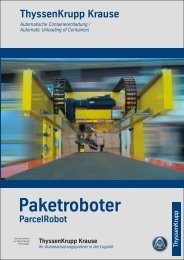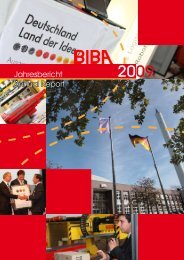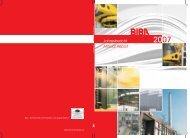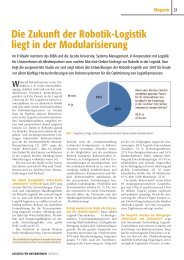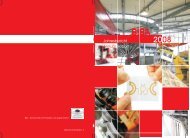Jahresbericht 2006 - Biba - Universität Bremen
Jahresbericht 2006 - Biba - Universität Bremen
Jahresbericht 2006 - Biba - Universität Bremen
Sie wollen auch ein ePaper? Erhöhen Sie die Reichweite Ihrer Titel.
YUMPU macht aus Druck-PDFs automatisch weboptimierte ePaper, die Google liebt.
Division IPS<br />
•<br />
neuen Anwendungsszenarien für<br />
klassische Methoden zur Planung und<br />
Steuerung,<br />
•<br />
Problemstellungen von Wartungsund<br />
Reparaturprozessen in Netzen,<br />
•<br />
Facetten der Dynamik in logistischen<br />
Systemen und Werkzeugen auf<br />
dem Gebiet der Modellierung und<br />
•<br />
der Gestaltung von Organisations-<br />
und Informationssystemen für<br />
logistische Netze.<br />
Integrative Gestaltung<br />
von Produktionsund<br />
Logistiksystemen<br />
Aufgabe der Abteilung Integrative<br />
Gestaltung von Produktions- und Logistiksystemen<br />
ist eine ganzheitliche<br />
und nachhaltige Optimierung von<br />
Produktions- und Logistiksystemen.<br />
Betrachtungsebenen sind dabei<br />
sowohl die betriebstechnische, die<br />
informationstechnische als auch die<br />
soziale Ebene von Unternehmen,<br />
Lieferketten oder Unternehmensverbünden.<br />
Daraus ergeben sich vielfältige<br />
Forschungs- und Anwendungsfelder<br />
sowie Aufgaben:<br />
•<br />
die Modellierung und Simulation<br />
zum ganzheitlichen Verständnis von<br />
Produktions- und Logistiksystemen,<br />
•<br />
die Betrachtung von technischen<br />
(RFID-Technik, robotergestützte Automatisierung)<br />
und arbeitsorganisatorischen<br />
Innovationen sowie<br />
•<br />
die Erarbeitung von ganzheitlichen<br />
Konzepten zu deren Integration<br />
in das sozio-technische Produktionsund<br />
Logistiksystem.<br />
Bernd Scholz-Reiter<br />
The rapid development of Real<br />
Awareness Technologies, such as Radio<br />
Frequency Identification Devices (RFID),<br />
and new possibilities for robot-supported<br />
automation of logistic processes, are<br />
strong forces for change in production<br />
and logistics systems. Intensive and global<br />
competition as well as changing and<br />
diverse customer requirements boost the<br />
necessity for using these technologies,<br />
and also be able to develop adaptive,<br />
flexible and dynamic production and<br />
logistics systems. However, these systems<br />
can only unfold their full capacity, if<br />
logistic planning and control are more<br />
decentralized and dynamic as well.<br />
Against this background, the research<br />
domain Intelligent Production and<br />
Logistics Systems (IPS) sees as its major<br />
challenge<br />
the research, development and application<br />
of new awareness technologies<br />
•<br />
for production and logistics,<br />
•<br />
the automation of logistic processes<br />
and<br />
•<br />
the development of efficient practicesuited<br />
decentralized dynamic planning<br />
and control procedures for production<br />
and logistics.<br />
The findings resulting from basic<br />
research projects, which are done in cooperation<br />
with the department of „Planning<br />
and Control of Production Systems“<br />
at the University of <strong>Bremen</strong> and in the<br />
context of the Collaborative Research<br />
Centre (SFB) 637 „ Autonomous Cooperating<br />
Logistics Processes „ (see P. 49),<br />
are realized in contract or joint research<br />
with prominent production and logistics<br />
enterprises. This also happens as part<br />
of the Research Group Logistics (FoLo),<br />
particularily with the Demonstration and<br />
Application Center for Mobile Technologies<br />
in Dynamic Logistics Structures.<br />
IPS is also strongly involved in the International<br />
Graduate School for „Dynamics<br />
in Logistics“, whose thematic emphasis<br />
is placed on the control of dynamic<br />
aspects in production and transportation<br />
logistics. The department of Planning and<br />
Control Methods for Logistics Systems is<br />
concerned with the topics such as e-logistics,<br />
dynamics as well as planning and<br />
control in particular under real awareness<br />
aspects. The emphasis here is placed on<br />
the study of the paradigm of Autonomous<br />
Cooperating Logistics Processes in<br />
the context of the SFB 637. The activities<br />
cover the study of new application<br />
scenarios for classical methods concerning<br />
the planning and control, problem<br />
definitions for maintenance and repair<br />
processes in nets, facets of dynamics in<br />
logistic systems and tools in the area of<br />
modelling and design of organization<br />
and information systems for logistic nets.<br />
Task of the department of Integrative<br />
Organization of Production and Logistics<br />
Systems is a holistic and lasting optimization<br />
of production and logistics systems.<br />
The approaches are the technical, the<br />
information-technical and the social<br />
aspects of enterprises, supply chains or<br />
enterprise groups. The resulting research<br />
and application fields are: modelling and<br />
simulation for the holistic understanding of<br />
production and logistics systems, viewed<br />
from both technical (RFID technologies,<br />
robot-supported automation), as well<br />
as work-organizational innovations and<br />
development of holistic concepts for their<br />
integration in socio technical production<br />
and logistics systems.<br />
Bernd Scholz-Reiter<br />
5



